Smartphone Round Robin: HTC Fuze, Windows Mobile, and Choice
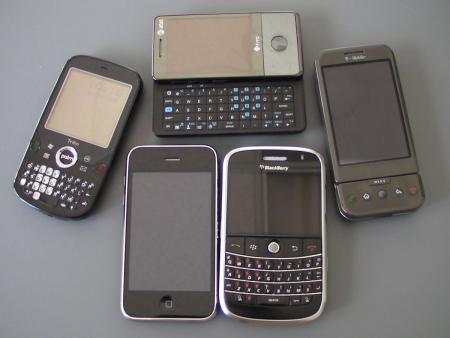
The Smartphone Round Robin took quite the unexpected hiatus -- I've been awfully busy these past few weeks and truth be told it was Windows Mobile itself that helped me manage my increasingly hectic worklife. In case you missed it, here's my Video of the Fuze, including some details on how I've decided not to use TouchFlo 3D. Now that I'm back on Windows Mobile, it's time to explain why it's a great OS. Although the Round Robin contest is now over (we'll announce the winners tomorrow!), I'm betting you all will have plenty to say about this year's take on WM.
So read on!
Same as it ever was
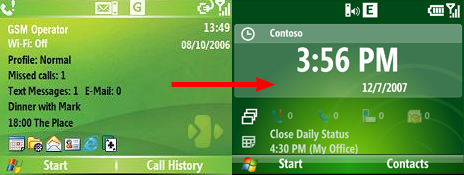
Whenever somebody asks me "Why Windows Mobile?" I invariably tell them to search for the word "Triumphant" here at WMExperts, as it will lead you to last year's final Round Robin article on the HTC Tilt. Windows Mobile has seen some pretty good progress since then (though, granted, not as much as we'd like) and I fully expect that we'll see even more progress in the coming year as newer version of WM come out. What I don't expect to change, however, are the core reasons I love Windows Mobile. I'm not sure I can state them better than I did a year ago:
Windows Mobile will work on a wide... a crazy-wide selection of different form factors, from the ruggedized to the razor-thin. It runs on cheap phones and feature-packed phones alike; touchscreen and non-touchscreen; QWERTY keyboard, 10-key, 20-key, no-key; screen resolutions of 240x320, 240x240, 320x320, 320x480, heck, 800x600; it communicates on Edge, UMTS, HSDPA, EVDO, EVDO Rev A, GPS, WiFi, and Bluetooth (including A2DP).It's available on every major wireless carrier, basically worldwide. It is available in many languages in a dizzying number of countries. It has a fairly consistent UI across the entire variety of devices just listed, had it for several years, and maintained a healthy level of backwards compatibility. It's able to do pretty much anything any other smartphone can do, and more, on nearly all of the form-factors and networks listed above. It does push email out-of-the-box with Exchange and can do the same with any other email setup with some 3rd party software. [...]It has a vibrant community of 3rd party application developers. Coding can even be done with .net (familiar to many Windows developers), which provides an amazing set of APIs to build complex applications with rich UIs -- with relative ease.Enterprise security and support is second only to BlackBerry (and many would say second to none), yet remains approachable to many average joe consumers.It plays pictures, music, podcasts, FM Radio (on some devices), and video ...and records pictures, audio, and video too.
That's a lot of self-quoting, but it's all still very much true, will continue to be true, and frankly -- will continue to be a unique set of features amongst all the different smartphone contenders out there for some time to come.
The short version is that Windows Mobile is all about choice and power. The ability to use essentially the same platform on a wide array of phones on every carrier is a big, big plus. Whatever your carrier, there's a Windows Mobile smartphone available for you with a huge feature set and a deep library of apps and community support to get you going. Many of the tips, tricks, and software you will find for, say, the HTC Fuze on AT&T will also work on the older Treo 700wx on Sprint. These two phones feature different versions of the WM OS, completely different form factors, processors, screens, and features -- yet they use the same OS and are both 'hackable' in very similar ways.
The flip side of that coin is that WM hasn't seen as much advancement as we'd like in the past few years -- but it's a testament to the power and flexibility of the platform that it has held up at all. Windows Mobile is infinitely extendable, meaning that HTC, Samsung, and yes, even Palm to some extent, have been able to innovate and alter the core of the OS to produce new smartphones on what is essentially a very similar system over the course of the past few years.
Comparisons to other platforms throws the flexibility and extendability of Windows Mobile into sharper relief. Unlike the iPhone, every developer has the opportunity to create an app that will work in a multitasking environment, that can still run in the background. Unlike the BlackBerry, Windows Mobile phones fully utilize both RAM, ROM, and memory cards to store and run their apps. Unlike Android, Windows Mobile is fully capable of great enterprise integration. Heck, unlike Palm's as-yet-unreleased webOS, Windows Mobile offers deep access to nearly every part of the system to anybody who wants to write an app to take advantage of it. And it's had these advantages for years.
Get the Windows Central Newsletter
All the latest news, reviews, and guides for Windows and Xbox diehards.
What surprises many people the most when I talk about Windows Mobile as a platform is how open it is. "Microsoft? Open? Come on!" Indeed, I've chafed at a lack of openness on Windows Mobile (exhibit A: locked down GPS) myself. Still, compared to Apple's arbitrary App Store rules, Windows Mobile practically feels Open Source. It even offers more access to developers and entry-level hackers (like myself) than the actual Open Source OS in this Round Robin, Google Android. If I want to change how a certain button behavior happens on Android, I'd need to learn me some Java, possibly some other more complicated Linux code, and then go to work. Doing the same on Windows Mobile: searching for a registry edit or downloading one of several apps to do it for me.
I don't want to gloss over Windows Mobile's problems, however. First and foremost: the User Interface is showing its age. The biggest complaint about the TouchFlo 3D today screen (and even with TouchFlo before it) is that it "dumps" you back into the standard Windows Mobile interface and the difference is jarring. After seeing the iPhone's slick UI, Android's clever notification's sytem, and even some of the improvements made to BlackBerry's UI with their new wireframe themes, it's clear that Windows Mobile needs a new look and some new UI metaphors system-wide.
I'm not entirely sure just what those changes need to be, beyond a simple fresh coat of paint, but that would at least be a start (as long as the paint didn't just apply to the Today Screen). Some other low hanging fruit would include an improvement to the look and feel of menus, which often feel poorly organized, poorly drawn, and tacked-on. Another good move would be to finally get a real, honest-to-god browser in there, because although I'm relatively happy with the upcoming IE6, it still lags well behind the iPhone and Android.
Structurally, WM could stand to be a little snappier -- at least on the Pro/Touchscreen side of the OS. This problem will only get worse until there are some standard graphics chip requirements for the platform. There are times with the Fuze when I've suspected that if the OS were better able to talk to a graphics chip, things would move along with much less lag.
Yet for all this, I'm still a WM user and still recommend it to people. Standard edition is fast, stable, and great for new users and power users alike. Pro isn't quite as fast or as adept at managing memory, but it makes up for that with sheer power and customizability.
The great thing about Windows Mobile is that you can customize the heck out of it. The terrible thing about Windows Mobile is that often you have to customize the heck out of it.
HTC Fuze vs the Rest
Now, I've already published a Review of the HTC Fuze and what's more, we've even compared the HTC Fuze to the Treo Pro in a smackdown. Definitely take a look at those two articles if you're looking for a good take on the device considered in a Windows Mobile context. The question at hand now is how does it fare in cross-platform context?
Fuze vs G1
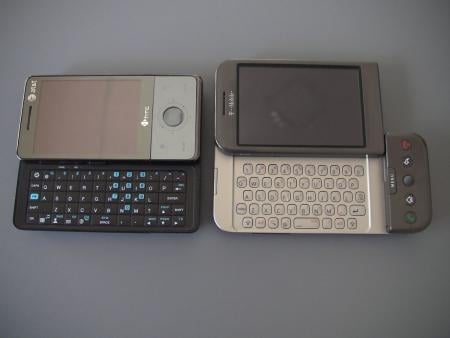
Our two HTC slides are both pretty thick, both require two hands to use, and both sport operating systems that occasionally suffer from inconsistencies. I tend to prefer the Fuze to the G1 from a hardware perspective because overall it is smaller, has a higher build quality, and generally feels more professional -- HTC's long history with Windows Mobile really shines through. I do wish that Windows Mobile could be tweaked enough to support a capacitive touch screen.
Obviously I also prefer the OS on the Fuze to Android, though not in every regard. Right now, it seems as though Android has more momentum than Windows Mobile (though it's not moving as quickly as I expected), but Windows Mobile still beats the pants off of G1 in terms of functionality. In terms of ease of use, Android is probably a little bit ahead for the average user, but being so adept with Windows Mobile I'm actually much better at navigating and getting things done with the Fuze than I am with the G1.
Fuze vs Treo Pro
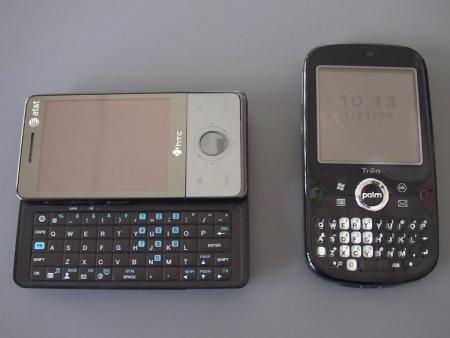
Again, a more definitive comparison between these two smartphone has already been written here, so I'll just hit the highlights. I prefer the Treo Pro's one-handed use and the fact that it has a real 3.5mm headset jack. Those two features -- plus the fact that it's thinner -- make it my go-to Windows Mobile device these days. It's tough giving up the Fuze's excellent screen resolution and occasionally I find myself popping my SIM in the Fuze so I can be a little more productive -- but in the end I'm a one-handed guy and the Fuze is too often a two-handed device.
Fuze vs Bold
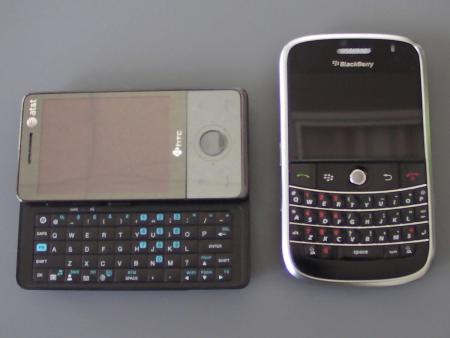
Boy, we could really get into it here. You already know the broad outlines: The Fuze is more powerful all around, the Bold does email differently-but-better-for-most-people, ease of use is a toss-up for me since the Fuze sports a touchscreen while the BlackBerry sports a trackball, both have vivid, high-resolution screens, and so on.
For me, the bottom line is that as great as the hardware on the Bold is, I just have to give up too much control to use it. Email doesn't come in the way I want, the platform itself doesn't have the depth and tweakability I want to fix every niggle I have, and quite honestly - I think that the BB OS is now officially the Mobile OS in our Round Robin with the earliest expiration date. There are just too many limitations that go 'all the way down' to how it operates at a basic level. Like Palm, RIM is going to need to embark on a complete overhaul of their entire OS sometime in the next few years. For their sake, I hope they've already started it in some super-secret skunkworks room.
Fuze vs iPhone
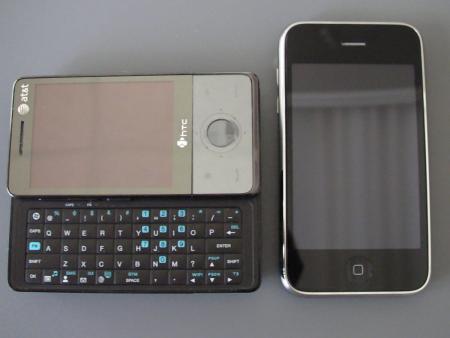
I prefer a physical keyboard. I prefer an OS that lets me install what I want and change what I want instead of dictating that I can't have a fart app one day and then deluging me with fart apps the next. I want to be able to set a different default browser. I want to be able to sync to whatever cloud service I feel like directly from the device.
There are a lot of things that I want, and the iPhone only gets two of them exactly right: great browser and great media player and Apple is as-yet unwilling to truly allow third-party developers to fill in the gaps. It's as simple as that.
Choice
"Choice" is a pretty lackluster way to describe Windows Mobile's "killer feature," but there it is. "Choice" doesn't have the primal pull of the iPhone's singular form and UI, the 'Crack' of the BlackBerry, the nerd-factor of Android. Nevertheless, it's why I like Windows Mobile. No matter what your exact needs are -- carrier, form factor, enterprise-specific software, media, whatever -- Windows Mobile has a device and the software to fit them. It might not always do it as easily or as beautifully as I'd like, but it's definitely more capable than anything else.
And so, by inexplicably popular demand, I've updated last year's Triumphant Return to Windows Mobile photo for early 2009. Below you'll see all but a few of what's currently offered in the US on the Windows Mobile platform, plus a Redfly thrown in for good measure. There are a couple stragglers/extras here, but the bottom line is there are more than twenty different WM smartphones that are available in the US, all of which will be compatible with your software and sporting interfaces that are similar enough that a Windows Mobile user can get comfortable with any of them in a day.

One free cookie to the first person who can name every device pictured.
Maximin
Another quote from last year's article that describes what I'm getting at:
In decision theory there are lots of ways at looking at a given problem - I'm fond of Maximin (choose the option with the best worst case scenario) and Maximax (choose the option with the best best case scenario). If you're a Maximax kind of person, you take the smartphone with the best features in the categories you care about and choose that smartphone, regardless of whether or not the downsides are painful. So if you love your email quick and simple and don't care about, say, multimedia, the BlackBerry is no-brainer.If you're a Maximin kind of person, you care about a lot of categories but are willing to forego the “best of the best” in one or all of them. That's me - I want it all. I'm unwilling to accept bad email, or horrible multimedia, or an OS that's not powerful enough. Windows Mobile may not be the best in the categories I care about (even though it's close and could be), but it does a better job of covering all the bases than anything else out there.
The Out-of-Box experience with the Fuze is definitely better than it was with the HTC Tilt -- due in large part to TouchFlo 3D. Beyond that, though, it still takes some tweakery to get it above, say, a 7/10 in each usage category. With some tweaking and some software, though, you can get media, browsing, email, twittering, ..whatever into the 8 and higher range. With other platforms, I'll find one feature, like gmail (Android), communication (BlackBerry), or media (iPhone), or browsing (iPhone and Android) that's an 8 or 9 of 10, but despite trying I can't ever seem to get the other categories up in that range.
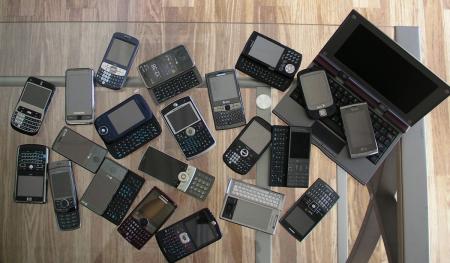
One last note before I sign off -- the Fuze is great, but for me one-handed usage is more important, so I gravitate towards devices like the Treo Pro, the Motorola Q9h, or the BlackJack II. If you're thinking about a new smartphone, you should do some serious thinking about whether or not a touchscreen is absolutely necessary. Windows Mobile Standard, the non-touchscreen version, is fast, stable, easy-to-use, and with 6.1 has a really slick sliding panels home screen. Were it not for the fact that we felt that TouchFlo 3D needed to get some Round Robin attention, we would have definitely gone with a Standard device. Depending on how the outlook looks next year, we might just do that.
Why do you love Windows Mobile?

